[ad_1]
Sometimes, when I’m winning a Total War battle handily, I like to pick an absolutely haggard group of low-tier hopelesses and spend the rest of the fight zoomed in on them, narrativising their high-stakes struggles in a rich and velvety internal monologue that monopolises my attention so fully that I more or less ignore the rest of the battle. That these are among my absolute favourite Total War moments may say something about the level of satisfaction to be found elsewhere in the series’ strategy sandboxes, at times as robust as ancient oaks, others as stale as ancient wotsits. It may be an admission on both our parts that, for all its simulated complexity, Total War is really for people who’d be just as happy playing with those little elasticated catapults and plastic castles, if we could still sit on the floor without our pelvises crumbling into soup mix.
Total War: Pharaoh, which I will acknowledge once and once only as being officially stylised PHARAOH, is almost certainly the most systemically interesting and quality-of-life-full a Total War game has been at launch for a very long time. Three Kingdoms has better diplomacy, Warhammer has unequivocally better goblins, but none are as refreshingly cavalier and passionately thorough with the blueprint of what Total War has the potential to be. CA Sofia should be immensely proud of what they’ve done here, but the realities of Total War’s ridiculous release schedule now clearly mean that even a studio as willing and able to innovate so much in such a short time frame are effectively prevented from producing a genuinely exciting strategy game. I’d love to tell you these new plastic castles are more fun than your old ones, but there’s not even any catapults.
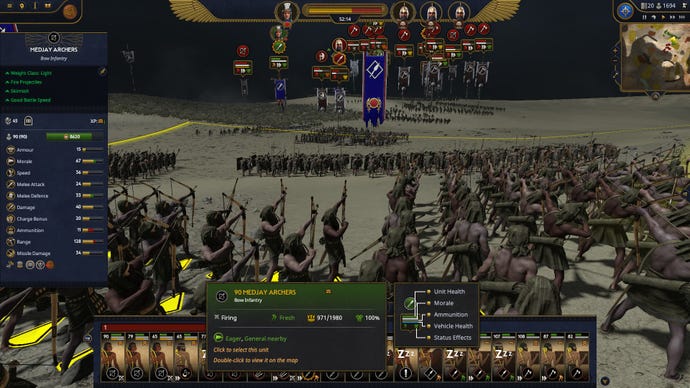
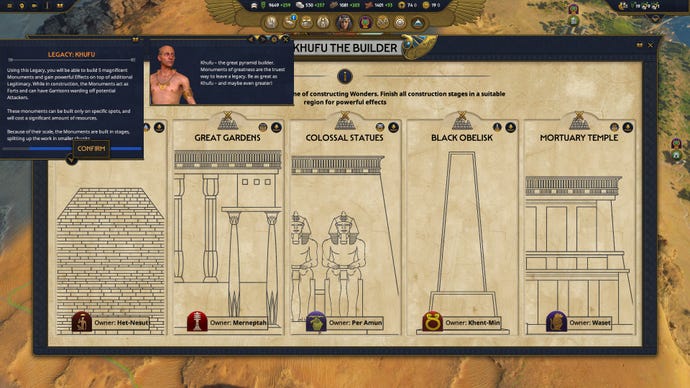
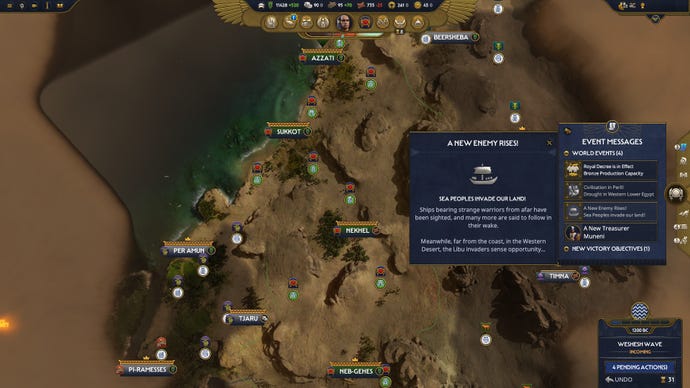
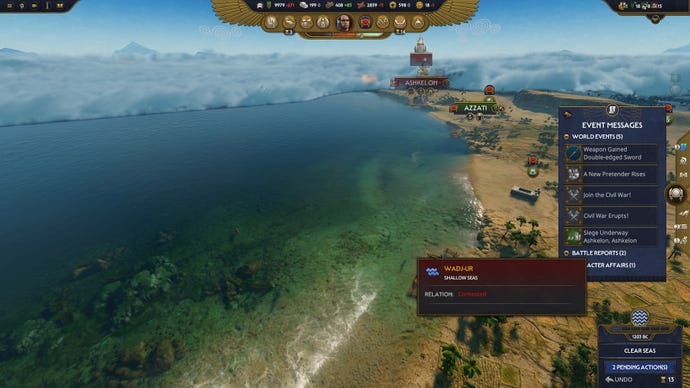
I played my first campaign as Irsu, a Canaanite raider lord. Imagine Brian Blessed but he’s been hit in the face a few times with another Brian Blessed swung by an inexplicable third Brian Blessed. His defining unique building is the “forced labour compound”, a sort of high security Amazon fulfillment gulag that boosts resource production at the cost of provincial happiness. Irsu nourishes his inner aesthete by tastefully arranging giblets on the end of his spear, but I doubt even he could deny how bloody gorgeous Sofia’s rendition of Egypt and its surrounding lands are. Gorgeous, but also tangible as a land, rather than just a cartographer’s tool, thanks to topographical diversity and savage desert attrition.
And let’s not forget the coastlines. They giveth with idyllic surf and bountiful fish farms for keeping your armies fed, and they taketh away by being the literal first ports of call for Pharaoh’s main source of friction: invading armies of sea people. “They’re the main threat to your empire!”, Sofia insisted when I spoke to them a few months back. I silently scoffed with all the derision of a man whose misplaced confidence necessitated a comedically poetic reprisal in the form of stacks upon stacks of dangerous armies bearing down on my carefully pruned flowerbeds with sandals made from thousands of virtuosic stitches, each spelling out a hearty “fuck you buddy” in whatever language sea people speak. Pharaoh never lets you forget that your empire of sandstone is made of the same stuff that trickles through hourglasses.
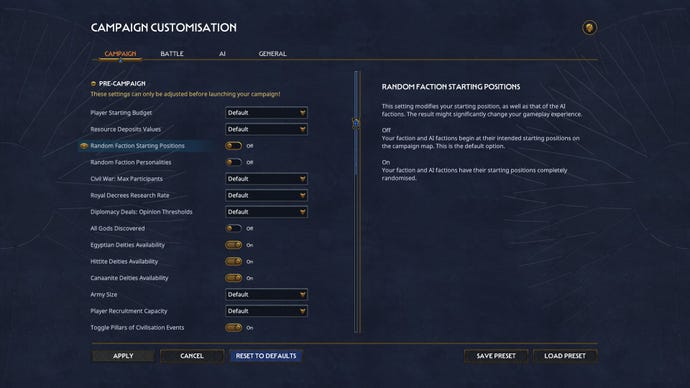
| Image credit: Rock Paper Shotgun/Sega
So what can men do in the face of such reckless sandalism? Well, you can build outposts for one. Capturing a settlement in Pharaoh doesn’t just grant its own ownership, but that of several surrounding sites, on which can be built your choice of forts, shrines, trading posts, and the like. Set up a string of forts along the coast, for example, and fill them with garrisons for a juicy upkeep reduction. Or dot waystations across your empire to help armies travel faster from one end to the other. It means more decisions, more and bigger battles, and faster ways to get into the action when you simply cannot wait to throw a sea person back into the sea. They’re a great addition.
Neither iteration nor innovation are in short supply here, but if you ask me about the bits that had me excitedly rushing to take notes, there was far less of “Oh wow you can choose a legacy and build the great pyramid” and far more “You can UNDO TURNS now!”. Sure, having a unit give ground to lead foes into an ambush is neat, but did you know that holding down space on a battle map now removes tree tufts like a raging onceler so you can see what’s going on better? How about the dedicated standard bearers, and their flags that tatter and tear to show how battered a unit is? Have you seen those stylised unit cards and how genuinely useful they are for differentiating ‘bloke with spear’ from ‘bloke with slightly sharper spear’? Arse ladders are gone! No one in the Bronze Age could fit an entire siege ladder up their rectum! It’s official! Sofia make Total War games like a team that spend lunchtimes making fun of Total War games, and I mean that in the best possible way.
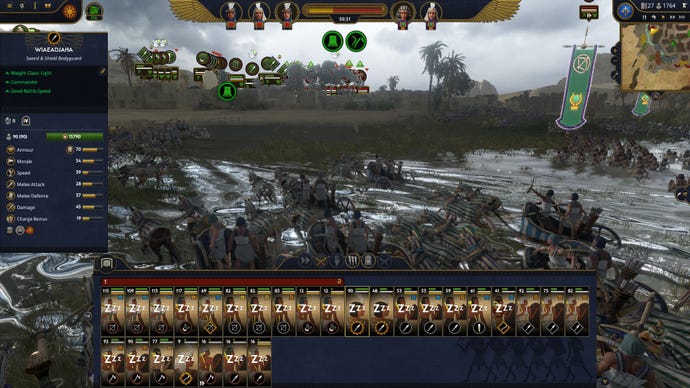
| Image credit: Rock Paper Shotgun/Sega
That’s not to say battles themselves aren’t host to some impressive changes, but here’s the sticking point: By ‘impressive’ I mean ‘impressive how close these battles come to actually being fun enough for me to not sigh out loud most of the time when I can’t autoresolve”. Herein lies the tragedy of Pharaoh. No amount of nifty unit abilities to throw sand in the eyes of opponents, or push forward, or lob javelins into the spokes of chariots to slow them down can make up for the fact that bronze age tech makes for dull scraps. No amount of gorgeous maps and weather conditions and dynamic mud patches to lure heavily armoured troops into can remedy the fact that I’ve set up in the same formation every battle for a hundred turns and only lost when I was hopelessly outnumbered, and even then rarely. Nothing can make up for the fact that no-one can fix Total War in this sort of timeframe. Every single time I assault a minor settlement, the enemy abandon the safety of the walls within the first ten seconds. That’s not how walls work, mates!
You know what definitely can’t fix Total War? The pre-order cosmetic packs Pharaoh has. Is this a step toward calling up an unpaid intern in the diplomacy menu who will trade you resources or join your wars for real money? Probably not. But it is naff. It makes the future of the modding scene (i.e CA’s shadow QA department) hazy, and it feels like a corpo mandate that stinks up the hard work of creatives that recent events have shown us management have no scruples about shafting on a whim. Don’t do this, I would say. You will lose more in player goodwill than you will gain in short term pocket change injections, I might suggest.
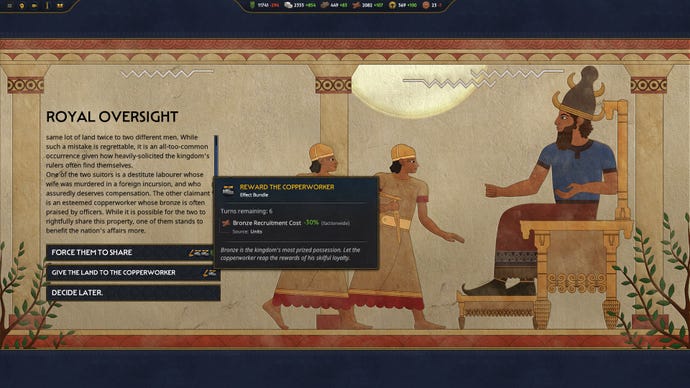
| Image credit: Rock Paper Shotgun/Sega
If you’d like to usurp ancient leaders, though, Pharaoh has a neat court system you can schmooze your way through and eventually claim some positions. You might gossip your way to favour with the bod in charge of all the elite troops and convince him to lend you his hardest bastards for a bit, or you might curry favour with the acting Pharaoh themselves, letting you scheme with relative impunity and steal legitimacy – a key resource in grabbing the throne yourself – from your fellow councilors. It’s not especially in depth, but it does give a good sense of regular interactions with your chosen kingdom as a whole, rather than just the part you own.
Irsu eventually stabbed his way onto the throne, crowning himself great king of the Hittites by greedily devouring legitimacy from capturing sacred lands. I had assumed that this was where Pharaoh would transform into something even richer, but it really just offers several new tiers of buffs in the form of Royal Powers. I began a new game as Ramesses, whacked the difficulty up, and genuinely struggled to maintain a functional empire in the face of sea people invasions and scheming pretenders. There’s life in the old hippo yet, for sure; a nifty, detailed 4X set in a gorgeous rendition of a fascinating empire, at least on the climb. Sofia have made the absolute best of a bad situation here, and I’ve had a good, freeing time taking part in what basically feels like an interactive design conversation. You’ll probably want to, you know, play something fun though.
This review is based on a review build of the game provided by publishers Sega.
fbq('init', '700623604017080');
fbq('track', 'PageView'); window.facebookPixelsDone = true;
window.dispatchEvent(new Event('BrockmanFacebookPixelsEnabled')); }
window.addEventListener('BrockmanTargetingCookiesAllowed', appendFacebookPixels);
[ad_2]
